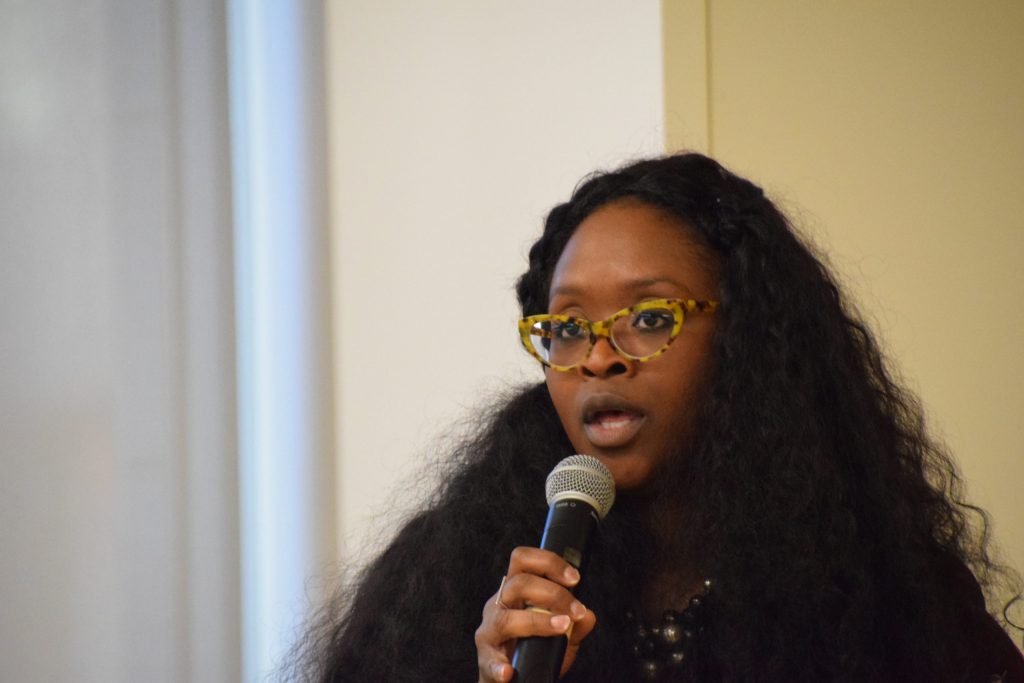
From growing up in Sweetwater, North Carolina to writing “Sweetwater: Black Women and Narratives of Resilience” to researching representations of black women in reality TV shows, Robin Boylorn had a chance to deliver her perspective to Bradley students this week.
Boylorn, a professor at the University of Alabama, is a critical ethnographer and self-described “crunk” feminist. She visited Bradley on Tuesday, her timing coinciding with the beginning of women’s history month and the end of Black History Month, to give two lectures.
The first lecture was cohosted by the women and gender studies and communication departments, and covered “Sweetwater,” which was read by classes within both programs.
“My work, ‘Sweetwater’ included, is just committed to giving voice to marginalized experiences, helping us have conversations about difficult, taboo topics, me being willing to be as transparent as possible about my own experiences in an effort to get other people to open up about theirs,” Boylorn said.
“Sweetwater,” originated as a dissertation project and came together over several years. The first part was an ethnography about Boylorn’s hometown of Sweetwater and the women living in it. The second half was an autoethnographic parallel narrative, Boylorn’s own account of her life and family.
“In ‘Sweetwater,’ I wanted to privilege the voices and experiences of the women I interviewed, so the first half of the book features their stories and the themes that emerge from them,” Boylorn said. “The second half of the book is my story, but it was limited to my version of the themes that emerged from their stories.”
Going back to Sweetwater after living in Florida for school posed some challenges for the ethnographer.
“I think that the biggest challenge was related to my role as an insider-outsider, like my role as a family member and member of the community, but also as a researcher, someone who no longer lived full-time in the community,” Boylorn said.
Boylorn was also challenged to overcome the response she received from her mother during the beginning stages of the dissertation. She said her mother seemed hurt when seeing her trauma in written form.
“I wanted to figure out a way to humanize their experiences and to create stories that would resonate with others,” Boylorn said. “Whether they were black women from the rural South or not.”
Ashley Sasso, a senior sports communication major, said she is unfamiliar with these kinds of experiences, but thought “Sweetwater” was a good read.
“It’s really eye-opening to read about from personal perspectives about living as a black woman in a small town like Sweetwater,” Sasso said. “It’s really eye-opening for someone who won’t know that experience, even though you still can’t exactly relate to it.”
Her second lecture Tuesday evening covered “ratchet respectability,” her research on representations of black women in reality television.
Boylorn coined the term “ratchet respectability” and defines it as “a form of resistance wherein black women simultaneously challenge and accept stereotypic characterizations of race, gender and class.”
She also talked about the tropes of black women in love that are portrayed in these shows. These tropes include the gold digger, independent, jezebel, wifey, side chick and settler.
The shows analyzed included “Flavor of Love,” “Love and Hip- Hop,” “Basketball Wives” and “Real Housewives of Atlanta.” The first black bachelorette, Rachel Lindsay, in 2017 was also a topic of conversation.
Latrice Cook, a senior psychology major, said it was important for the lecture to be held on Bradley’s campus because issues with diversity and stereotypes still exist here.
“By different people speaking, we realize … that everybody comes in different shades and you shouldn’t base your expectations off of how African American women are perceived in reality TV, or even in media, because everybody put their spin and twist,” Cook said.
Tony Adams, chairperson for the department of communication, has known Boylorn for 17 years and thinks of her as a leader in communication of personal narratives and discussions about identity.
“I loved having somebody across the span of three hours demonstrate two very different research projects,” Adams said. “I loved the contrast of these projects and it should show the various things communication professors do and what they write about.”
After they earned their Ph.Ds. from the University of South Florida, Adams went to Chicago while Boylorn went to Alabama. They still continue to work together on projects about race, identity and sexuality.
“Black women want to see representation of themselves and I do believe they want to see positive, negative, c o m p l i c a t e d ,” Boylorn said. “They want to see those nuanced representations, but we don’t always get that opportunity.”
Boylorn suggested that in order for this to occur, black women that are in positions to be creators, create platforms where these stories can be told. She said they can’t expect networks like Bravo and VH1 to do it because they are making too much money on negative representations.
“It honestly will be up to black women to do it,” Boylorn said. “That would be an additional thing on their ongoing list of things to save the world.”
